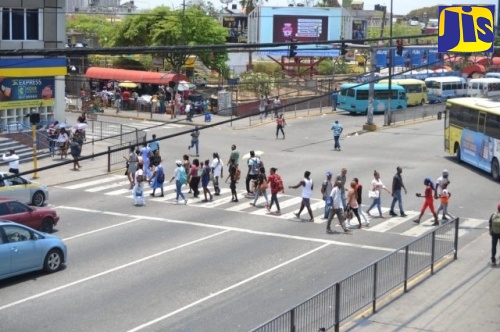Jamaicans Urged to Adhere to Rules of the Road
By: , December 14, 2023The Full Story
With 401 road fatalities recorded since the start of the year, Vice Chairman of the National Road Safety Council (NRSC), Dr. Lucien Jones, is urging Jamaicans to adhere to the rules of the road to reduce road crashes and deaths.
The figure represents a 13 per cent reduction in road deaths, compared to 461 persons killed for the corresponding period last year.
In an interview with JIS News, Dr. Jones said the Council remains concerned about the number of lives that have been lost on the roads.
“We count each life as precious. Last year this time it was about 461, so we are down… but that gives us no comfort because far too many people have died in our country,” he says.

Data from the Road Safety Unit indicate that up to December 13, the parishes of Westmoreland, St. Catherine and St. Andrew accounted for the highest number of fatalities, to date, while males accounted for 88 per cent of the fatalities.
Also, pedestrians and private motor-vehicle drivers each account for 18 per cent of the road users killed since the start of the year; private motor-vehicle passengers, 11 per cent; motorcyclists, 32 per cent; commercial motor-vehicle passengers, two per cent; pedal cyclists, five per cent; public passenger vehicle drivers, two per cent; pillion passengers, four per cent; public passenger vehicle passengers, five per cent; vulnerable road users (pedestrians, pedal cyclists, motorcyclists and pillion), 59 per cent; and passengers, 23 per cent.
Dr. Jones is urging Jamaicans to slow down on the roads, arguing that excessive speeding, overtaking carelessly, and people failing to keep left are the main causes for accidents and deaths.
“Those are the three main reasons, plus pedestrians who are not using the road carefully. So, we are saying to the entire driving public and those who are using the roads, just slow down,” he implores.
“If you slow down, lives will be saved; if you slow down, you will escape getting a fine, which is now a hefty fine, and you might have demerit points attached to your licence as a driver, and if you don’t pay the fine or you don’t go to court, you can have a warrant executed on you for your arrest,” Dr. Jones added.
He is further imploring persons to use their seatbelts, both at the rear and front of the vehicle.
“Many people have this notion that if they’re in the back seat then you are safe; it is not true. Many people have died because when a car comes to a halt suddenly, people are thrown from the rear to the front, people have crashed into the windshield and have died, and have crashed into the seat in front of them and have died,” the Vice Chairman tells JIS News.
He informs that most of the tickets that are now being issued by the police are for people who do not use their seatbelts.
Furthermore, he is urging pedestrians to remain alert while using the road and not to wear dark clothing at night.
“It makes it very difficult for the driver to see you. Wear light-coloured clothing so that people can see you; use the roads carefully – look left, look right, look left again before you cross the road,” he advises.

Dr. Jones is also warning against the improper use of mobile devices by motorists and pedestrians, noting that they are distractions.
“Do not listen to your cell phones when you’re crossing the road. It’s a dangerous practice. You get distracted, you’re not paying attention, you’re not alert, and if a car is coming at speed, it can hit you down,” he says.
“In the same breath, drivers who are driving, do not use your cell phone without a hands-free instrument. It’s a source of great distraction, not just internationally, but in Jamaica. It is now part of the law. It wasn’t before [but] the new Road Traffic Act mandates that you should use a cell phone only with a hands-free instrument,” Dr. Jones adds.
He is further encouraging persons not to drive under the influence of alcohol or ganja.
“This is a season when people tend to be drinking alcohol. If you’re going to a party, have a designated driver, make sure that that person stays alcohol-free so that they can take you home,” the Vice Chairman says.
“Driving under the influence of alcohol is a very dangerous thing. It slows your reflexes; it makes you unable to stay in your lane, which is a major issue, and people tend to crash much more often when you’re under the influence of alcohol. The same thing goes for ganja – do not smoke ganja and drive; it’s a mind-altering substance. It will make you crash and you can die or suffer serious injuries,” he adds.
He tells JIS News that motorcyclists and pillion passengers must wear their helmets.
“Most of the motorcyclists who are dying are dying because they’re not wearing their helmets and they crash and suffer severe brain injury,” Dr. Jones points out.
He notes that of the 126 motorcyclists who have died for the year, so far, very few have been wearing their helmet, adding that lack of helmet use is the same for the pillion.
Dr. Jones says that road deaths tend to increase during the months of November and December.
“So far for December, 14 people have died, and we are now at December 12 – far too many. In November, 41 died, and that’s the kind of pattern we have seen over the years for November and December, the end of the year. We don’t want this kind of disaster to happen to us. So, we’re asking everybody to be alert; to heed the warnings to live for 2023 and live for 2024,” he tells JIS News.
The Vice Chairman says the provisions affiliated to the new Road Traffic Act have been assisting with curbing indiscipline on the roads.
“The New Road Traffic Act is working. The ticketing system is working – not as efficiently as we would hope, but it is working. So, it’s a warning for people not only to slow down that you might escape a crash and prevent injuries and prevent death but also that there are consequences if you are caught, in terms of paying a fine and having demerit points attached to your licence. So, you can have your licence suspended, so these are serious matters,” he says.
The new law also covers a demerit system, outstanding traffic tickets, learner’s permit, new code governing the thread depth of tyres, and strengthening of the Island Traffic Authority to suspend and revoke driver’s licences, among others.
Furthermore, Dr. Jones says in addition to the strengthening of legislation that governs the use of the road, other supporting factors, which incorporate several agencies of Government, are critical in ensuring road safety.
These include safe speeds, safe roads, safe vehicles, an efficient post-crash system as well as safe road users.
“The NWA (National Works Agency) has to work with us that we have safer roads. The Bureau of Standards has to work with us that we have safer cars, and the police, we are working with them to ensure we have safer speeds on our roads and then working with the Ministry of Health to ensure that we have an efficient post-crash system,” the Vice Chairman says.
He says the Council anticipates the greater use of technology to capture infractions committed by motorists.
“We are looking forward to the use and introduction of cameras to detect infraction, speeding and breaking the red light. That should be in place by the first quarter of next year,” Dr. Jones explains.
“We can’t have a policeman in every corner, so that will make a big difference when we have cameras both to detect people who are doing wrong things and also to send a ticket to the [owner] of the car. So, we are looking forward to that next year, among other things,” he adds.
The NRSC was established in 1993 as a non-profit organisation by public and private-sector interest groups.


